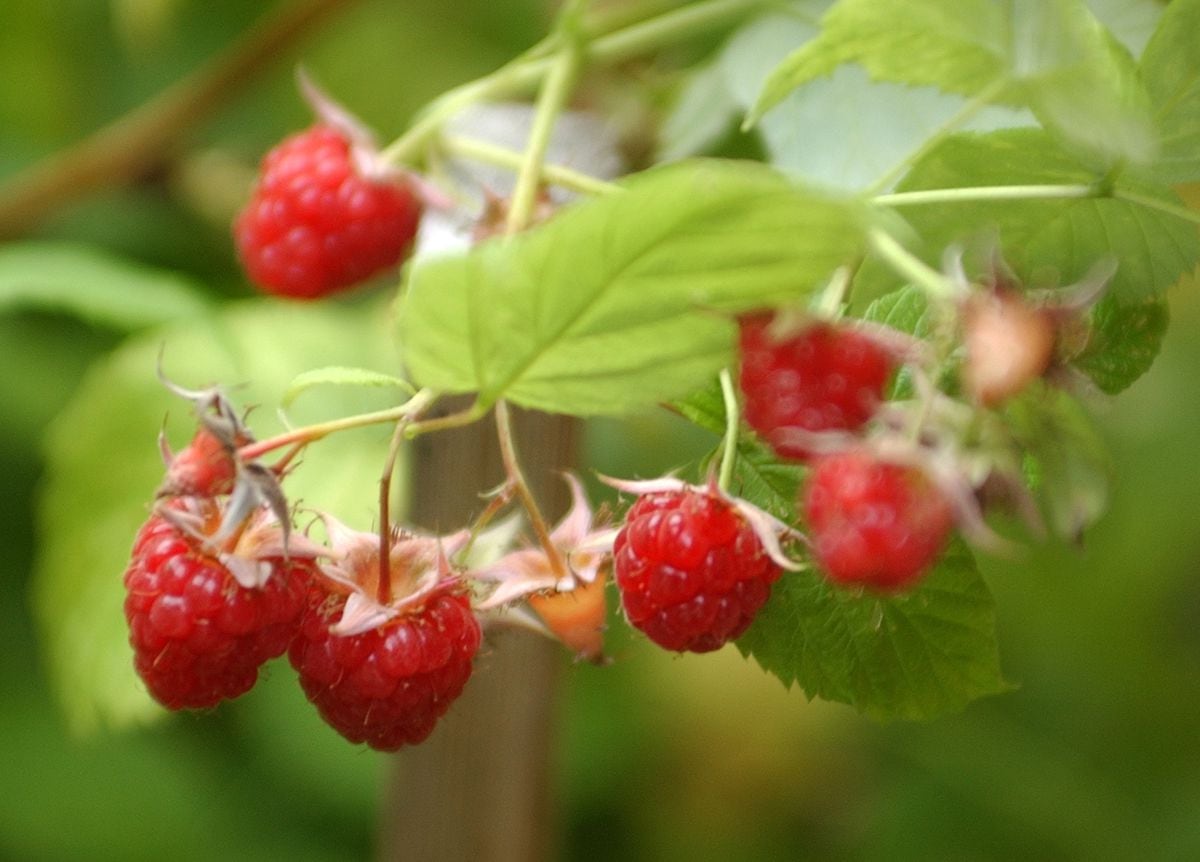
The loyal reader knows that part of my formative years was spent in the family’s huge raspberry patch. It was a four-rower, properly wired up to support berry-laden bushes. The aisles between the rows were just wide enough to slip in and harvest. I was short in the early years, and the place was like a maze.
Mom had an unlimited number of hand-sized, woven, wooden baskets, the kind store-bought berries then came in. Late in the afternoon she would hand them out and make us go pick. Sometimes there were quotas set and sometimes there were spot inspections to make sure we hadn’t missed any. Pint after pint would accumulate each night.
And there were always raspberry fights. We had to be a bit more careful than when flinging cherries or apples at each other. An ill-aimed raspberry leaves a tell-tale stain. This was in the days before paintball.
So, if my truth be told, the experience left me bored by raspberries. For me, if there is any thrill to growing them, it is to discover that the golden ones planted a few years back are producing something different than the millions of raspberries I have picked over time. One after another of the same, red-staining, not-quite-enough-for-a-mouthful, seed-filled tart fruit.
And yet here in Alaska, raspberries seem to make a lot more sense. They are extremely easy to grow. I worry about their invasive nature, frankly, but I have already dissed them enough, and they are clearly the most prolific, high-producing fruit an Alaskan can grow. Harvests are perfect for juicing, freezing, canning, baking, making syrups, dehydrating and, of course, eating.
Why didn’t yours produce this year or why do you have a weak harvest or why are your berries so small? It could be your patch is still young. Canes produce only leaves the first year and then leaves and fruit the second year. It takes a while to get a patch established.
The smaller berries might be a result of lack of water. And the berries at the tops of plants are smaller than those at the base. This, plus control of canes, is why it is a good idea to trim yours in the spring to make sure your plants concentrate energy on those “lower” fruits.
I have never fertilized our berries. We do, however, apply copious quantities of leaf mulch around our plants in the fall and sometimes more in the spring. When I cut back last year’s canes in late September, I run them over with the mower and “blow” them in-between plants. All of this “cold composts” into great microbial food and the microbes feed the plants. This also means we never have to weed our patch.
There are worms that attack leaves, yellow jackets competing for fruit and other problems that might cause a grower concern, but the big problem with raspberries in Alaska is mildew: botrytis. It attacks fruits this time of year and then the whole plant. If you don’t carefully inspect and remove infected berries, the whole crop can be lost. Those fuzzy powders are a gazillion spores ready to infect.
That golden raspberry variety is called “Fallgold.” It is available from local nurseries. You may not realize that there are two other colors, red and purple. It is possible to have a real rainbow in a bowl. In all cases, new plants are formed mostly from rhizomes that grow underground from existing plants, so if you give them a bit of room, you can expect your plants to slowly spread.
Jeff’s Alaska garden calendar for the week
Alaska Botanical Garden: Open to the social-distancing, mask-wearing public. Wonder what may be in bloom? Check it out before you go: alaskabg.org. There are all manner of activities, including a nursery that offers many of the plants you will see in bloom. Discounts for members! Join.
Strawberries: They are a favorite — of slugs, birds, bugs. They also ripen off the vine to a certain extent, so you might be able to beat the pests to them.
Aphids and yellow jackets: They go hand in hand. The yellow jacket populations increase when there is plenty to eat. Be careful out there. Don’t swat. Walk away.
Potatoes: Keep hilling.
Weed: NOW.
Lawn patterns: Send me pictures of your work. Winner gets an autographed copy of one of my books.
[Because of a high volume of comments requiring moderation, we are temporarily disabling comments on many of our articles so editors can focus on the coronavirus crisis and other coverage. We invite you to write a letter to the editor or reach out directly if you’d like to communicate with us about a particular article. Thanks.]
"fruit" - Google News
July 31, 2020 at 02:14AM
https://ift.tt/39NRGNl
Raspberry bushes aren't producing good fruit? Here's what could be happening. - Anchorage Daily News
"fruit" - Google News
https://ift.tt/2pWUrc9
https://ift.tt/3aVawBg
Bagikan Berita Ini














0 Response to "Raspberry bushes aren't producing good fruit? Here's what could be happening. - Anchorage Daily News"
Post a Comment